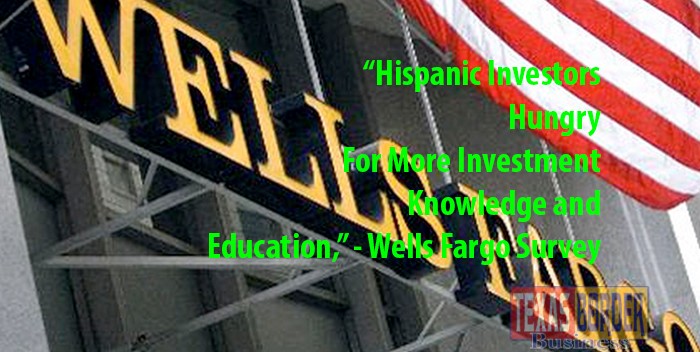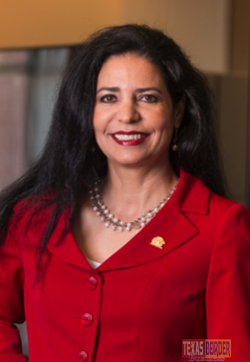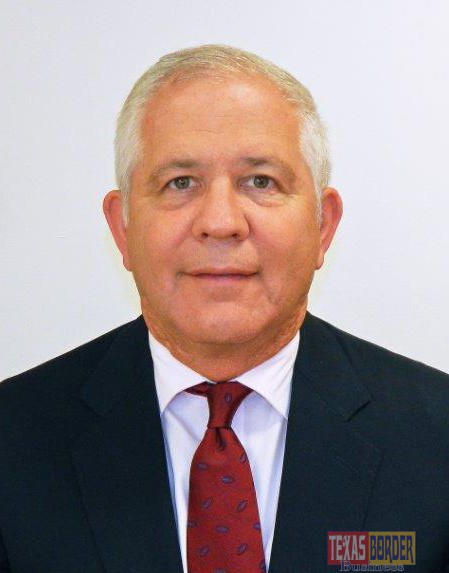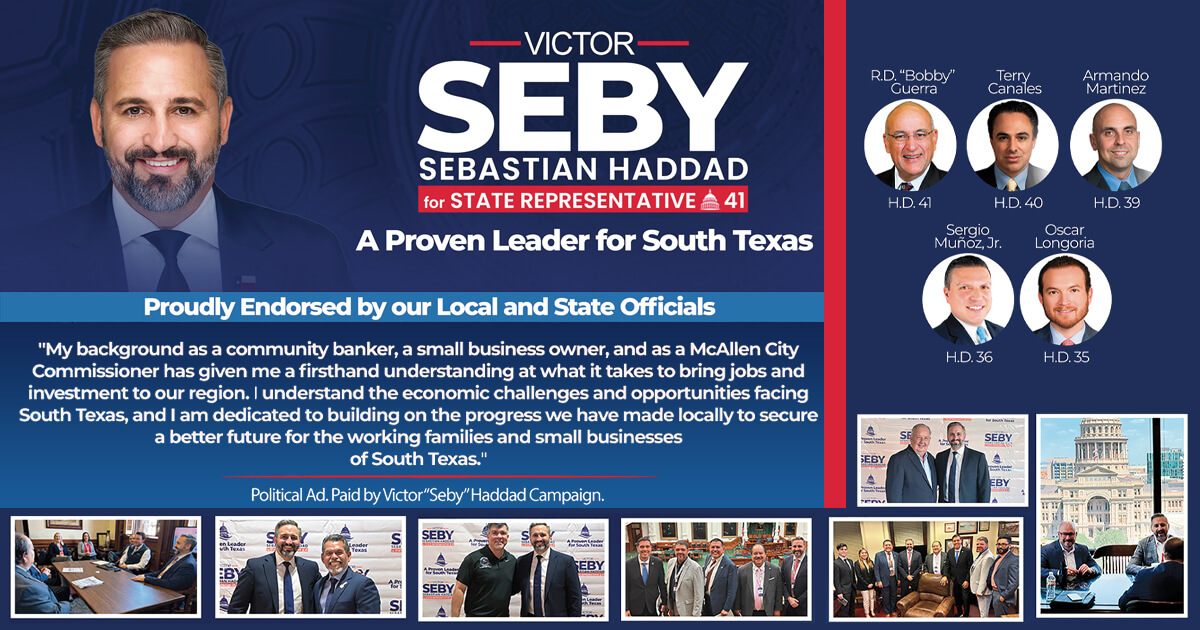
Texas Border Business
Cultural Importance of Family Greatly Influences Money Decisions
SAN FRANCISCO, August 2014— Hispanic investors have a strong appetite for financial education and more sophisticated investment knowledge, according to a recent Wells Fargo survey of Hispanic investors. Almost half of polled Hispanics (45%) say that no one ever taught them about saving and investing (versus 31% of U.S. investors overall), and three out of four (75%) wish they had learned more about managing money when they were growing up (compared to 61% of U.S. investors overall).

According to Alma Ortega Johnson, South Texas Area President for Wells Fargo Bank, “Most Hispanic investors (72%) stated they wish they knew more about investing in mutual funds, stocks, and bonds (versus 64% of U.S. investors overall).”
Despite a strong interest in personal finance and investing, one in three Hispanic investors surveyed (34%) do not feel comfortable investing in mutual funds, stocks, or bonds (versus 27% among U.S. investors overall). However, if they did invest in stocks and bonds, most Hispanics surveyed (70%) felt they would earn money on those investments (12% feel they would lose money, and 18% feel they would break even).

“These findings highlight some interesting attitudes among Hispanic investors and shed light on their strong desire for more education on the fundamentals of investing,” said Steve Novak, Senior Investment Strategist, Wells Fargo Private Bank. “Our findings suggest there’s an opportunity to bolster the investing confidence of Hispanics through knowledge so they can act on what they intuitively know to be true around the importance of investing for their financial futures.”
Additionally, survey responses indicate Hispanic investors are far more risk-averse than others, with almost half (47%) preferring to put money for the future into savings with no risk of losing it (compared to 35% of U.S. investors overall). More than half (56%) of Hispanic investors feel that the best place to keep their savings is in bank accounts (38%) or real estate (18%). In contrast, fewer than half (45%) of all U.S. investors feel that the best place to keep their savings is in bank accounts (32%) or real estate (13%).
One in ten (10%) Hispanic investors give themselves an ‘A’ when it comes to their financial and investing literacy (versus 17% among U.S. investors overall). Half of Hispanic investors (47%) give themselves a grade of ‘B’, and another third (34%) give themselves a ‘C’ (similar to U.S. investors overall).
Strong Connection to Family and Community
Family dynamics play a significant role in how Hispanic investors think about their personal finances and financial future. This is true in terms of lessons learned about money growing up, a sense of responsibility for taking care of family members financially, and how they think about their future retirement.
Fifty-five percent of Hispanic investors agree that “raising and investing in kids is the best retirement plan,” compared to 41% among U.S. investors overall, and one quarter (24%) expect to rely on family members to live and make ends meet in retirement, compared to 13% of U.S. investors overall.
Hispanic investors are also more likely than other investors to lend and borrow money within their families. Almost 60% provide financial support to others in their families or communities, compared to 44% of U.S. investors overall, while half (54%) have lent or given money to an adult family member in the last year, compared to 39% of U.S. investors overall. Of those providing financial support to others, 81% provide direct financial support by giving money or paying bills.
Thirty-one percent of Hispanic investors are supporting adult children, parents, grandparents, extended family, or others, compared to 26% of U.S. investors overall, and 6% are providing financial support for people who live outside the U.S. (compared to 1% of U.S. investors overall).
Among Hispanic investors with kids, 28% say they want their kids out of the house and on their own the day they turn 18 (same as U.S. investors overall). Fifty-nine percent say they want to have money to pass on to family or friends (similar to U.S. investors overall), and 17% say that wanting assets for an inheritance most motivates them to build up their savings and investments (compared to 8% of U.S. investors overall).
Conversations with Parents
Nearly all Hispanic investors polled (92%) say their parents talked “a lot” or “sometimes” about the value and importance of hard work when they were growing up (similar to 89% of U.S. investors overall), but fewer than half said their parents talked as much about financial issues, including:
- how they managed money and spending (45%, similar to 40% of U.S. investors overall)
- what they were saving for and how much (36%, similar to 31% of U.S. investors overall)
- how they were planning for retirement (29%, similar to 33% of U.S. investors overall)
- how much money they made (27%, higher than 19% of U.S. investors overall)
How the Industry Stacks Up
More than half (57%) feel that the financial issues and needs of Hispanic Americans are different from other Americans. Currently, Hispanic investors give above-average grades to their primary banks or financial institutions with which they do the most business. The average grade for being Hispanic-friendly was a ‘B’, and for addressing the needs of Hispanic customers, they received a ‘B’. At the same time, 76% of Hispanic investors say financial services providers treat them with respect, yet 46% feel like they don’t have enough money to get personal attention from banks. The survey revealed that 35% of respondents age 25-39 prefer financial professionals who are Hispanic (compared to 26% of those age 40-49 and 13% of those age 50-59).
About the Survey
These survey findings are based on an online survey conducted between June 12 and June 24, 2014 among 528 Hispanic investors nationwide. Qualified respondents were non-students, age25-75, who are the primary or joint financial decision-maker in the household with household investable assets of at least $10,000. The survey also included a national comparison sample of 530 general population investors. Survey results were weighted on age, gender, household income, and race/ethnicity to ensure an accurate reflection of the investor population based on data from the Federal Reserve Board’s Survey of Consumer Finances. Assuming no sample bias, the maximum margin of error is ±4% for both the Hispanic and full U.S. samples.
About Versta Research
Versta Research is a full-service market research firm, headquartered in Chicago, Illinois, specializing in customized strategic market research and public opinion polling. For more information, visit www.VerstaResearch.com.
About Wells Fargo Wealth, Brokerage and Retirement
Wells Fargo Wealth, Brokerage and Retirement (WBR) is one of the largest wealth managers in the U.S., with $1.6 trillion in assets. WBR includes Wells Fargo Private Bank, serving high-net-worth individuals and families; Wells Fargo Advisors, the third-largest brokerage firm in the U.S.; Wells Fargo Retirement, which manages $310 billion in employer-sponsored retirement plan assets for 3.7 million Americans; and Abbot Downing, serving ultra-high-net-worth individuals and families. Wells Fargo Advisors is the trade name used by two separate registered broker-dealers: Wells Fargo Advisors, LLC and Wells Fargo Advisors Financial Network, LLC, Members SIPC, non-bank affiliates of Wells Fargo & Company.
About Wells Fargo (Twitter @WellsFargo)
Wells Fargo & Company (NYSE: WFC) is a nationwide, diversified, community-based financial services company with $1.5 trillion in assets. Founded in 1852 and headquartered in San Francisco, Wells Fargo provides banking, insurance, investments, mortgage, and consumer and commercial finance through more than 9,000 locations, 12,500 ATMs, and the internet (wellsfargo.com), and has offices in 36 countries to support customers who conduct business in the global economy. With more than 265,000 team members, Wells Fargo serves one in three households in the United States. Wells Fargo & Company was ranked No. 29 on Fortune’s 2014 rankings of America’s largest corporations. Wells Fargo’s vision is to satisfy all our customers’ financial needs and help them succeed financially. Wells Fargo perspectives and stories are also available at blogs.wellsfargo.com and at wellsfargo.com/stories.
# # #
Wells Fargo Wealth Management provides products and services through Wells Fargo Bank, N.A. and its various affiliates and subsidiaries.
Wells Fargo & Company and its affiliates do not provide legal advice. Please consult your legal advisors to determine how this information may apply to your own situation. Whether any planned tax result is realized by you depends on the specific facts of your own situation at the time your taxes are prepared.













